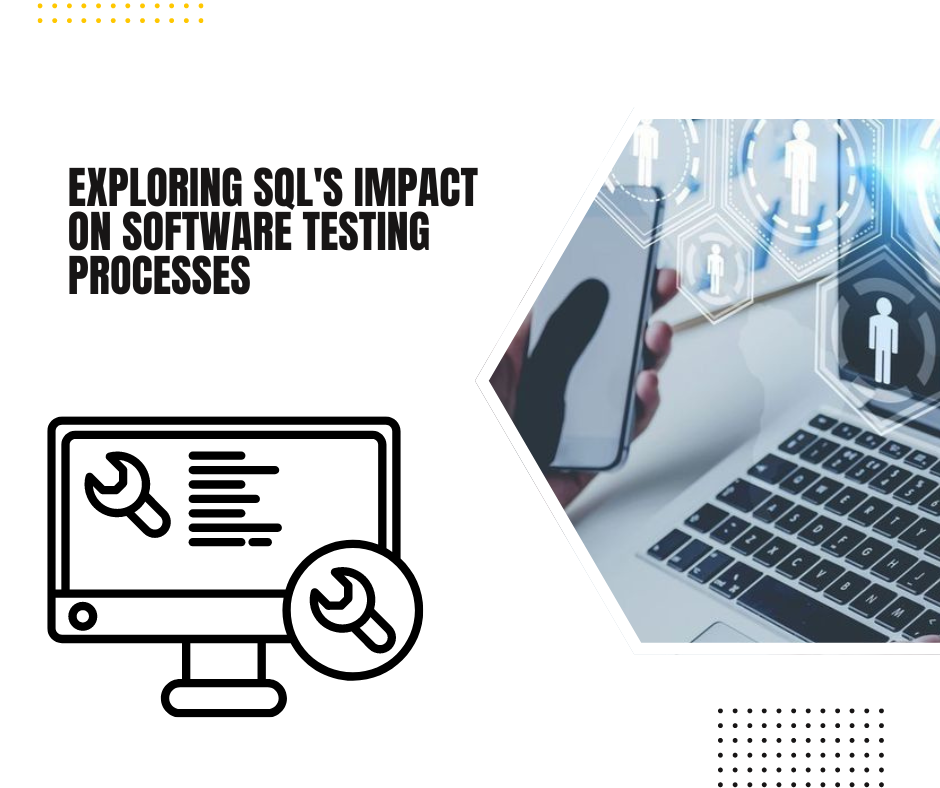Exploring SQL's Impact on Software Testing Processes
 Ruhi Parveen
Ruhi Parveen
Introduction:
Efficient testing processes are paramount in software development to ensure the quality and reliability of software products. One crucial component of modern software systems is the use of Structured Query Language (SQL) for managing and manipulating databases. Understanding the impact of SQL on software testing processes is essential for ensuring comprehensive testing and delivering high-quality software solutions.
Understanding SQL:
Structured Query Language (SQL) is a standardized programming language designed for managing and manipulating relational databases. It provides a powerful set of commands for querying, updating, and managing data stored in a database management system (DBMS). SQL is widely used across various industries and is an integral part of most modern software applications.
Impact on Software Testing Processes:
Data Validation:
- SQL plays a significant role in data validation during the testing phase. Testers use SQL queries to verify that data is correctly stored, retrieved, and modified in the database. By executing SQL statements, testers can ensure that data integrity constraints are enforced, and the application behaves as expected when interacting with the database.
Test Data Generation:
- Creating test data is an essential part of software testing.SQL facilitates the creation of realistic test scenarios by allowing testers to populate databases with relevant data. Testers can use SQL insert statements to populate tables with various data sets, enabling comprehensive testing of different application functionalities under different conditions.
Query Testing:
- SQL queries are extensively used in testing the functionality of database-driven applications. Testers write SQL queries to retrieve specific data from the database and verify that the application produces the expected results. By testing SQL queries, testers can identify performance bottlenecks, optimize database interactions, and ensure the accuracy of data retrieval processes.
Database Integration Testing:
- Many software applications rely on integration with external databases or third-party APIs. SQL is instrumental in conducting integration testing to ensure seamless interaction between the application and external data sources. Testers use SQL queries to validate data synchronization, data transformations, and error handling mechanisms during integration testing.
Performance Testing:
- SQL queries can significantly impact the performance of software applications, especially when dealing with large datasets or complex database operations. Testers conduct performance testing to evaluate the efficiency and scalability of SQL queries under various load conditions. By analyzing query execution times, resource utilization, and database indexing strategies, testers can identify performance bottlenecks and optimize SQL queries for improved application performance.
Best Practices for SQL-driven Testing:
Use Parameterized Queries:
- To prevent SQL injection attacks and ensure data security, testers should utilize parameterized queries instead of concatenating user input directly into SQL statements. Parameterized queries help mitigate the risk of malicious SQL injection by separating SQL logic from user input data.
Validate Query Results
- During testing, it's essential to validate the results returned by SQL queries against expected outcomes. Testers should compare query results against predefined criteria to ensure data accuracy and consistency.
Optimize Query Performance:
- Optimizing SQL query performance is critical for enhancing the overall efficiency of software applications. Testers should analyze query execution plans, identify performance bottlenecks, and optimize SQL queries using techniques such as indexing, query restructuring, and database normalization.
- Test Error Handling:
- SQL-driven applications should include robust error handling mechanisms to handle exceptions and edge cases gracefully. Testers should conduct thorough testing of error handling scenarios to ensure that the application behaves as expected under various error conditions.
Security Testing:
- SQL injection is a common attack vector for malicious actors looking to exploit vulnerabilities in software applications. Testers conduct security testing to identify and mitigate SQL injection vulnerabilities by attempting to inject malicious SQL code into application inputs. By testing the application's resistance to SQL injection attacks, testers can ensure that sensitive data is protected and that the application adheres to security best practices.
Regression Testing:
- Changes to SQL queries or database schema can impact the functionality of software applications. Testers perform regression testing to ensure that modifications to SQL queries do not introduce new defects or regressions in the application. By retesting existing functionalities after SQL modifications, testers can maintain the integrity and stability of the software product.
Test Automation:
- Automating SQL-driven tests can significantly improve the efficiency and effectiveness of software testing processes. Test automation frameworks can be used to automate the execution of SQL queries, validation of query results, and testing of database interactions. By automating repetitive testing tasks, testers can focus on more complex testing scenarios and improve overall test coverage.
Continuous Integration and Deployment (CI/CD):
- Integrating SQL-driven tests into CI/CD pipelines can streamline the testing and deployment process for software applications. By automatically executing SQL tests as part of the CI/CD process, developers and testers can quickly identify and address issues in database interactions, ensuring that changes are deployed to production with confidence.
Collaboration with Database Administrators (DBAs):
- Collaboration between testers and DBAs is essential for ensuring the optimal performance and reliability of database-driven applications. Testers can work closely with DBAs to optimize SQL queries, implement database indexing strategies, and troubleshoot performance issues. By leveraging the expertise of DBAs, testers can enhance the overall quality of SQL-driven testing processes.
Continuous Improvement:
- As software applications evolve, so do the testing processes associated with SQL. Testers should continuously evaluate and improve their SQL-driven testing practices to adapt to changing application requirements and technologies. By staying abreast of emerging trends and best practices in SQL testing, testers can enhance their skills and deliver higher-quality software solutions.
Conclusion:
SQL has a profound impact on software testing processes, influencing various aspects of testing, including data validation, test data generation, query testing, integration testing, performance testing, security testing, and regression testing. By understanding the role of SQL in software testing and adhering to best practices, testers can ensure the quality, reliability, and security of software applications. Embracing automation, collaboration, and continuous improvement is key to maximizing the benefits of SQL-driven testing and delivering high-quality software solutions. If you're interested in pursuing a Software Testing Certification Course in Delhi, Noida, Lucknow, Mumbai, Bangalore, or any other city in India, it can further enhance your skills and knowledge in this field.
Subscribe to my newsletter
Read articles from Ruhi Parveen directly inside your inbox. Subscribe to the newsletter, and don't miss out.
Written by

Ruhi Parveen
Ruhi Parveen
I am a Digital Marketer and Content Marketing Specialist, I enjoy technical and non-technical writing. I enjoy learning something new.